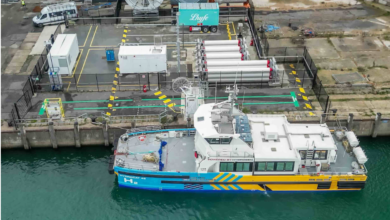ZeroAvia partners with ZEV Station; Doosan secures funding
ZEV Station and ZeroAvia partnership is expected to be a key catalyst to help kickstart hydrogen fueling for aviation in California and beyond.

ZeroAvia has signed an MoU for a new partnership with the hydrogen fuelling firm ZEV Station to develop green hydrogen refuelling infrastructure for airports in California.
The parties will work together on developing an initial regional airport project that represents sufficient scale to showcase how hydrogen-electric propulsion systems can deliver zero-emission commercial flights.
ZeroAvia will leverage its R&D in hydrogen production and refuelling for aviation alongside ZEV Station’s extensive team experience in providing gaseous hydrogen for road vehicles to develop an innovative hydrogen airport refuelling system.
As part of the partnership, ZeroAvia plans flight demonstrations of hydrogen-electric aircraft from pilot airports, supported by the co-developed refuelling ecosystem and dedicated support from ZEV Station.
ZeroAvia has already developed a fully functioning microcosm of potential refuelling operations. The Hydrogen Airport Refuelling Infrastructure (HARE), developed as part of the HyFlyer projects in conjunction with the European Marine Energy Center (EMEC), has demonstrated green hydrogen production through airside fuelling.
ZEV Station is engineering a groundbreaking highway zero-carbon fuelling station for fuel cells and Electric vehicles at the same forecourt. Their charging-only test site is slated to open at the end of next month. The first “Premier” ZEV Station with both charging and hydrogen is under permitting and targeted for operation in early 2023. ZEV Station is planning a network of stations producing their own hydrogen, delivered to satellite stations.
Doosan Mobility Innovation takes its first step into the logistics drone market
Doosan Mobility Innovation (DMI) has secured around 27 billion won worth of investment from IDG Capital, Korea Investment Partners, and DS Asset Management to recognise its growth potential in the hydrogen mobility business. The funds will be mainly invested in developing logistics cargo drones with hydrogen fuel cell technology.
DMI plans to spend the acquired funds on strengthening its product line-ups, enhancing global capabilities, attracting top talent, and developing the next generation of water-cooled fuel cells crucial for larger and heavier mobility such as logistics drones.
Already, DMI is participating in the national project to develop a logistics and cargo drone with a 10 to 50kg payload. The project aims to complete the commercialisation after 2025, which is the general period when logistics drones are expected to be on a full scale.
